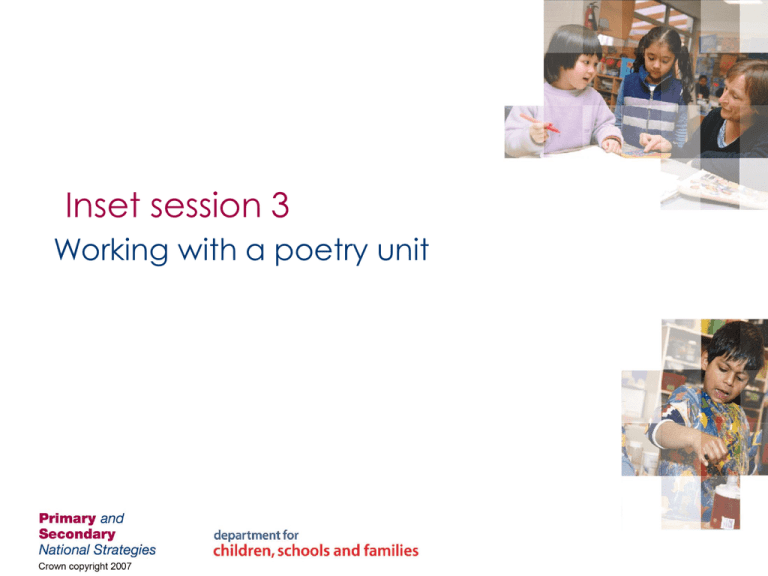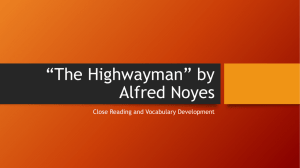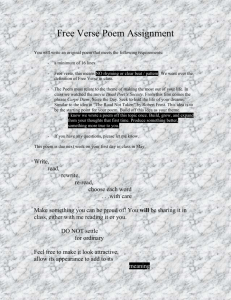Sample title
advertisement

Inset session 3 Working with a poetry unit Crown Copyright Statement • The content of this publication may be reproduced free of charge by schools and local education provided that the material is acknowledged as Crown copyright, the publication title is specified, it is reproduced accurately and not used in a misleading context. Anyone else wishing to reuse part or all of the content of this publication should apply to OPSI for a core licence. • The permission to reproduce Crown copyright protected material does not extend to any material in this publication which is identified as being the copyright of a third party. • Applications to reproduce the material from this publication should be addressed to: OPSI, The Information Policy Division, St Clements House, 2–16 Colegate, Norwich NR3 1BQ Fax: 01603 723000 e-mail: hmsolicensing@cabinet-office.x.gsi.gov.uk This inset session • demonstrates how an illustration can engage children in discussions which encourage them to speculate and infer meanings • illustrates how performing poetry can support children’ understanding and awareness of language. • demonstrates the ways drama approaches can support children’s ability to empathise with characters and recognise their motivations and feelings Using the poem The Highwayman, Alfred Noyes, Illustrated by Charles Keeping Artwork by Carles Keeping may be viewed at www.thekeepinggallery.co.uk. Key teaching approaches • • • • • • • • Reading aloud Responding to illustration Discussion Storytelling Freeze frame Writing in role Text marking and word collections Poetry performance Responding to illustration • What do you see in the picture? • What questions do you have about the character? • Make notes with a partner. • Share ideas with the whole group. Record this on a flipchart or IWB • Keep these notes so that you can look back on them later in the unit. Artwork by Carles Keeping may be viewed at www.thekeepinggallery.co.uk. Read the poem aloud in pairs, taking alternate verses What did you gain from reading it aloud? Open questions and discussion Working in groups of 4, discuss • What you liked about the poem • Anything you disliked about it • Anything that puzzles you One member of the group should keep notes Feed back to the whole group Storytelling • In pairs: • Draw a storyboard to show the main events in the poem. • Use the storyboard to help you take turns to tell the story of the highwayman Freeze frame • In groups of four create a ‘freeze frame’ for the scene in the story when Bess is tied to the bed, taking the parts of Bess, Tim and the soldiers. • Look at one group’s freeze frame discuss with them what they think the different characters might be thinking. Working with drama Writing in role • Building on from the drama, one of the activities in the teaching sequence is to write the story from the point of view of one of the characters. • Thinking about Bess, start to write the story from her point of view. Focus on the language Working with a partner look at the first verse of the poem: Read it aloud again then talk in pairs about the way the poet uses language. Highlight words and phrases that are particularly effective. Discuss the way rhythm is used Think about the sort of atmosphere which is created Performing parts of the poem • Use the text version of the poem • Working in groups of 4 you will be asked to work on one verse of the poem • Prepare a performance of your verse of the poem Ways of performing the poem To make the performance more interesting think about: • varying loudness and softness • having different people reading different lines or different characters • emphasising different parts by varying the number of voices reading e.g. have 2, 3 or 4 people read particular phrases or words • adding sound effects e.g. the wind When each group has had time to practise their verse perform the whole poem together Implications for Teaching and Learning (QCA 2004, 2005, 2006) Children need to be able to: • search text precisely to locate evidence (AF2) • read text closely for accurate interpretation of implicit meanings and support opinions by referencing to the text (AF3) • make inferences in narrative texts including empathising with characters and inferring feelings, thoughts, motivations and changes over the course of the narrative (AF3) • identify and comment on the structure and organisation of texts, including grammatical and presentational features at text level (AF4) • identify the intended effect of particular language choice (AF5) • talk about writers’ purposes and viewpoints, and the overall effect of the text on the reader e.g. overarching themes, plot structures (AF6) Which areas have you begun to address during these detailed discussions of The Highwayman? Read through the unit of work and discuss with a partner how you could use the unit and the teaching approaches in the classroom Acknowledgements • Illustrations by Charles Keeping from Noyes, A. 'The Highwayman', Oxford University Press, 1999. Used with kind permission of B.L. Kearley Ltd.






